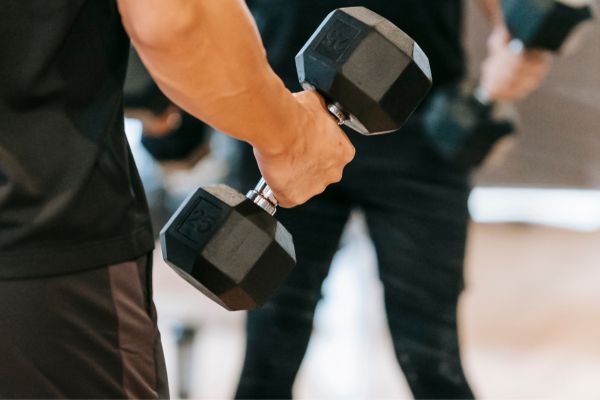
What is the role of protein in muscle recovery?
protein and muscle recovery and growth after exercise, cannot be overstated. Protein is essential for repairing and rebuilding muscle tissues that are broken down during intense physical activity. It helps to enhance muscle protein synthesis, which is the process by which new muscle proteins are created.
Consuming an adequate amount of protein after exercise not only helps to speed up recovery but also promotes muscle growth and strength gains. (1)
Therefore, athletes and fitness enthusiasts should prioritize including protein-rich foods in their post-workout meals or consider supplementing with protein shakes to maximize the benefits of their training sessions.
the process of muscle breakdown during exercise and the need for repair and recovery
Muscle breakdown occurs during intense exercise as the fibers in the muscles experience micro-tears. Protein plays a crucial role in the repair and recovery process by providing the essential amino acids needed for muscle tissue repair.
Without an adequate supply of protein, the process of muscle repair may be impaired, leading to slower recovery and potential muscle loss. Therefore, ensuring sufficient protein intake after exercise is vital for optimizing muscle recovery and maintaining overall muscle health. (2)
protein helps in repairing damaged muscle tissues and aids in their growth
Additionally, protein also helps to reduce muscle soreness and inflammation, allowing individuals to recover faster and get back to their training routine.
It is recommended to consume protein-rich foods such as lean meats, eggs, dairy products, and plant-based protein sources like beans and lentils within 30 minutes to an hour after exercise to maximize its benefits.
Moreover, for those who find it challenging to meet their protein requirements through diet alone, protein supplements such as whey protein powder can be a convenient option to support muscle repair and recovery.(3)
Benefits of consuming protein after exercise
1- Increased muscle protein synthesis, which leads to muscle growth and strength improvement
2- Reduction in muscle soreness and accelerated recovery time
3- Enhanced immune function and decreased risk of infections
Recommended protein intake after exercise
guidelines for protein consumption based on body weight and exercise intensity
For individuals who engage in moderate-intensity endurance exercise, it is recommended to consume around 0.5–0.7 grams of protein per pound of body weight after a workout. Those involved in high-intensity resistance training may benefit from consuming 0.7–0.9 grams of protein per pound of body weight.
For example, a person who weighs 150 pounds and engages in moderate-intensity endurance exercise should consume approximately 75-105 grams of protein after their workout. On the other hand, someone who weighs 200 pounds and participates in high-intensity resistance training should aim for around 140-180 grams of protein post-workout. These recommended protein intakes help support muscle growth, repair, and recovery after exercise.
It is important to note that these recommendations are not set in stone and can vary depending on individual goals and needs. Consulting with a healthcare professional or registered dietitian can provide personalized recommendations for protein intake after exercise.
different protein sources, such as lean meats, dairy products, and plant-based options
can be incorporated into post-workout meals to meet protein needs. Lean meats like chicken, turkey, and fish are excellent sources of high-quality protein.
Dairy products such as Greek yogurt and cottage cheese are also rich in protein and can be easily included in post-workout snacks or smoothies.
For those following a plant-based diet, options like tofu, tempeh, legumes, and quinoa can provide adequate protein. It’s important to choose a variety of protein sources to ensure a complete amino acid profile and maximize muscle recovery and growth.(4)
the significance of consuming a balanced meal that includes carbohydrates and fats alongside protein for optimal recovery
Consuming a balanced meal that includes carbohydrates and fats along with protein is essential for optimal recovery.
Carbohydrates provide the necessary energy to replenish glycogen stores in muscles, while fats aid in the absorption of fat-soluble vitamins and provide a steady source of energy.
Including all three macronutrients in a post-workout meal ensures that the body has the necessary building blocks to repair and rebuild muscle tissue, leading to faster recovery and enhanced muscle growth.(5)
Tips for incorporating protein after exercise into your diet
– Suggest convenient protein sources, such as protein shakes, bars, or Greek yogurt, for post-workout consumption
For example, after a tough workout, a person could have a post-workout protein shake made with whey protein powder and almond milk.
This provides a quick and convenient source of protein to help kickstart the muscle recovery process.
Additionally, they could also have Greek yogurt topped with nuts or seeds, which not only adds more protein but also provides healthy fats and carbohydrates for optimal recovery.
meal planning and preparation to ensure adequate protein intake throughout the day
For example, a person could plan and prepare their meals in advance to ensure they are consuming enough protein throughout the day.
They could include lean sources of protein, such as grilled chicken breast or tofu, in their lunch and dinner meals.
Additionally, they could incorporate protein-rich snacks like hard-boiled eggs or cottage cheese into their meal plan to maintain a consistent intake of protein throughout the day.
examples of protein-rich meals and snacks that can be easily incorporated into one’s diet
Some other examples of protein-rich meals that can be easily incorporated into one’s diet include a quinoa and black bean salad with avocado for lunch or a salmon fillet with roasted vegetables for dinner.
As for snacks, options like Greek yogurt with mixed berries, a handful of almonds, or a protein shake can provide a quick and convenient source of protein.
By incorporating these protein-rich meals and snacks into one’s diet, it becomes easier to ensure adequate protein intake throughout the day.



Pingback: What is the best way to suppress appetite?